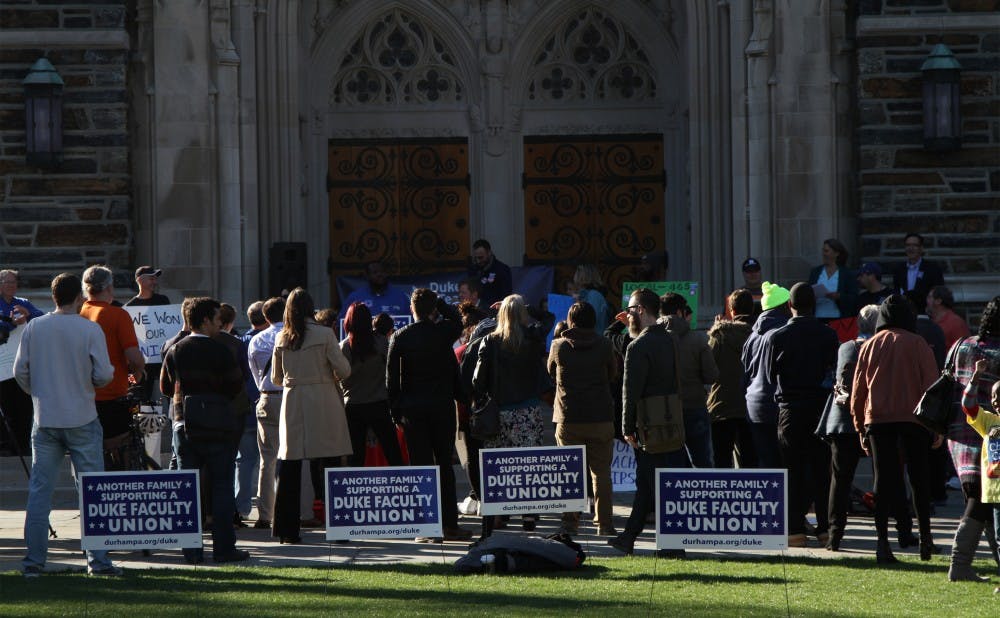The faculty union—which represents the University's non-regular rank, non-tenure track faculty—has reached a tentative collective bargaining agreement with Duke that must now be ratified by union members.
The tentative agreement for a three-year contract with the University's administration will be voted on by union constituents in a series of meetings and will take effect if supported by a majority of the voting faculty. The agreement was reached after nearly a year of negotiations between the union’s bargaining committee and Duke representatives.
"I can confirm that the University has reached a tentative agreement on a contract with the union and that the contract is now subject to ratification by the members of the bargaining unit,” wrote Michael Schoenfeld, vice president for public affairs and government relations, in an email.
Eileen Anderson, a lecturing fellow in the department of Romance Studies and member of the Duke Faculty Negotiating Committee, said that she found the negotiations to be “tense” at times, but that being part of the union has been an “empowering experience.”
She added that she thinks most union members will be happy with the contract, but noted that "not every single issue was addressed."
“This is our first contract, and our goal was to have parity—not with every tenured professor, but certainly with the category that is above us, which is mostly lecturers—so I think that generally we have achieved parity with the lecturers,” she said.
The negotiations started around the beginning of the last academic year. Anderson explained that the union typically had 15 to 25 members at the negotiation meetings, along with Larry Alcoff, their Service Employees International Union representative. The University also had a handful of representatives at the meetings, including Kyle Cavanaugh, vice president of administration.
The tentative agreement marks a step forward for the union and its membership, which consists of about 300 faculty members.
In a letter posted on the union's social media accounts, the Duke Faculty Negotiating Committee celebrated the agreement, announcing "we have some good news to report!" The letter notes that the two parties have agreed on ten issues, including compensation, benefits, access to workspace and materials and professional development.
“With the contract, everyone in our bargaining unit will receive a pay increase. Many people will receive longer contracts,” the letter reads. “We will have access to resources that other regular-rank faculty have had access to for years.”
The letter also outlines the ratification process for the agreement and encourages members to vote 'yes' on their first union contract. It lists the dates and times of three meetings during which faculty will be able to learn how the contract affects them specifically and vote on whether or not they want to work under it.
If ratified, the three-year contract will affect all members of the faculty union.
“My overall reaction, without seeing any of the details, is that getting a first contract—particularly in a contentious situation like this—is a big deal,” said Dan Bowling, senior lecturing fellow at Duke Law School. “Even if the terms and conditions are not what everyone in the union wanted going in, getting an employer to enter into a collective bargaining agreement has to be looked at by the union as a win.”
Bowling, an expert on labor and employment law, explained that negotiating contracts representing so many different groups of employees can be difficult, and is comparable to negotiating a contract for a manufacturing plant. The Duke faculty union represents professors from various departments from the Trinity College of Arts and Sciences, Center for Documentary Studies and Graduate School who all work under different teaching titles ranging from “lecturing fellow” to “adjunct professor.”
He also noted that unions made up of professionals—like the Duke faculty union—are a relatively new idea. Bowling added that the mechanics and possibility of going on strike for a faculty union are similar to a blue-collar union.
“Getting a contract without having to go on strike is, in my opinion, a good thing for the union and probably the University,” he said.
Anderson said that although she was not able to make every negotiation meeting because there were many of them, the ones she attended were sometimes very strained. She noted, however, that some of her colleagues found them “fun" and are happy with the final results.
“All in all, I think that reaching an agreement this quickly means that everyone was open to making a deal," she said. "If you had talked to me two months ago, I would probably have said ‘No, no way!'.... I’m pleasantly surprised, based on what I saw."
Get The Chronicle straight to your inbox
Signup for our weekly newsletter. Cancel at any time.
Bre is a senior political science major from South Carolina, and she is the current video editor, special projects editor and recruitment chair for The Chronicle. She is also an associate photography editor and an investigations editor. Previously, she was the editor-in-chief and local and national news department head.
Twitter: @brebradham
Email: breanna.bradham@duke.edu

